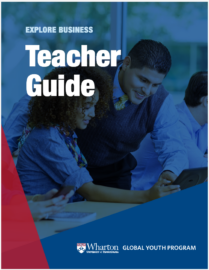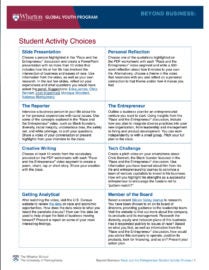This mini-site for high school students provides Wharton School-powered videos, readings, and activities to inspire deep thought and discussion around global business issues.
T he latest focus of our Explore Business learning model and materials is an acronym that is transforming the business world: ESG.
ESG, which stands for Environmental, Social and Governance, has become the unifying lens people are using to evaluate companies’ efforts to do more than just make a profit. How well does a company score on ESG? But ESG involves more than just screening a company’s beliefs and actions around social and environmental factors. As firms try to contribute positively to the environment, address governance activities, and support social causes, many are also working in different ways toward ESG compliance. Companies are thinking hard about how to incorporate ESG factors into their business strategies to appeal to investors, customers, employees and other stakeholders, and investors are using ESG as a new way to assess the value of their investment prospects.
This Explore Business mini-site presents the first topic in the Wharton School’s 2021 Beyond Business series: ESG: Tackling the Climate Crisis. A recent United Nations panel report blames human activity for rapidly warming the planet in the last millennium, with transportation and electricity generation as the two largest sources of carbon emissions.
In this discussion, Erika James, Dean of the Wharton School, joins a panel of experts to address the environmental piece of ESG, in particular how companies and policymakers can drive impact around climate change and how companies should evaluate their environmental footprint.
Dean James is joined in the discussion by Sarah E. Light, a Wharton legal studies and business ethics professor who specializes in corporate sustainability; Benjamin Keys, a Wharton finance and real estate professor; and David Swift, chief operating officer of impact investment group Engine No. 1.
The activities on this page connect to the “ESG: Tackling the Climate Crisis” discussion and provide opportunities for high school students to Explore Business. The linked worksheets will help direct students’ exploration of the shorter video segments, with guided questions and defined vocabulary. We encourage students to enjoy discovering new business insights – and contributing their own ideas to this important conversation.
“There are dire reports by the United Nations and others that a rise in severe weather events worldwide has put climate change on everyone’s radar screen. More and more people believe something needs to be done. What is the role that business should play in this endeavor?”
— Wharton Dean Erika James
The Full Discussion:
Tackling the Climate Crisis
Explore the Main Video Themes with These Shorter Segments
1. Companies Respond to Climate Change
Following a brief intro to ESG: Tackling the Climate Crisis, Wharton Professor Sarah Light outlines three ways that businesses are and should be taking action on climate issues.
2. The Language of Climate Change
Wharton Professor Sarah Light defines everything from Net Zero to Carbon Negative, while also doing a deeper dive into the concept of Greenwashing.
3. Climate Change and the Real Estate Market
Building on the increasing severity of weather events, Wharton’s Benjamin Keys talks about how the housing and mortgage industries are addressing the growing climate-related risks.
4. Climate Change As an Economic Issue
David Swift of Engine No. 1 explains why his firm believes that environmental issues are economic issues, and how that is changing the way companies and investors address risk.
5. Understanding Disclosure and Transparency
ESG compliance is requiring companies to be more open and honest with their reporting, which is leading to important decision-making outcomes for both investors and businesses.
6. Protecting Investors from Climate Change Risk
COO David Swift describes Engine No. 1’s investment strategy known as the Total Value Framework, a new approach to understanding the risks associated with a business.
7. Where Is the Greatest Impact?
All three panelists talk about what they see as the most effective strategies for dealing with the climate crisis, including the importance of changing individual behavior.
For Teachers and Students

The Teacher Guide is a resource to help educators understand the purpose of the Explore Business series of mini-sites on ESG and to provide guidance for using the videos and worksheets on this page with your students.
The Choice Board allows students to select individual projects and activities that help them reflect on Explore Business themes and apply them to their own experiences. The student activity choices are meant to support in-person and remote classroom learning.

Explore Business with Wharton Global Youth
Our Explore Business mini-sites are gateways to conversations, readings and activities that inspire high school students to think more deeply about issues affecting business and society. Dig into these Wharton-powered learning opportunities wherever and whenever you want to explore timely and compelling topics.





